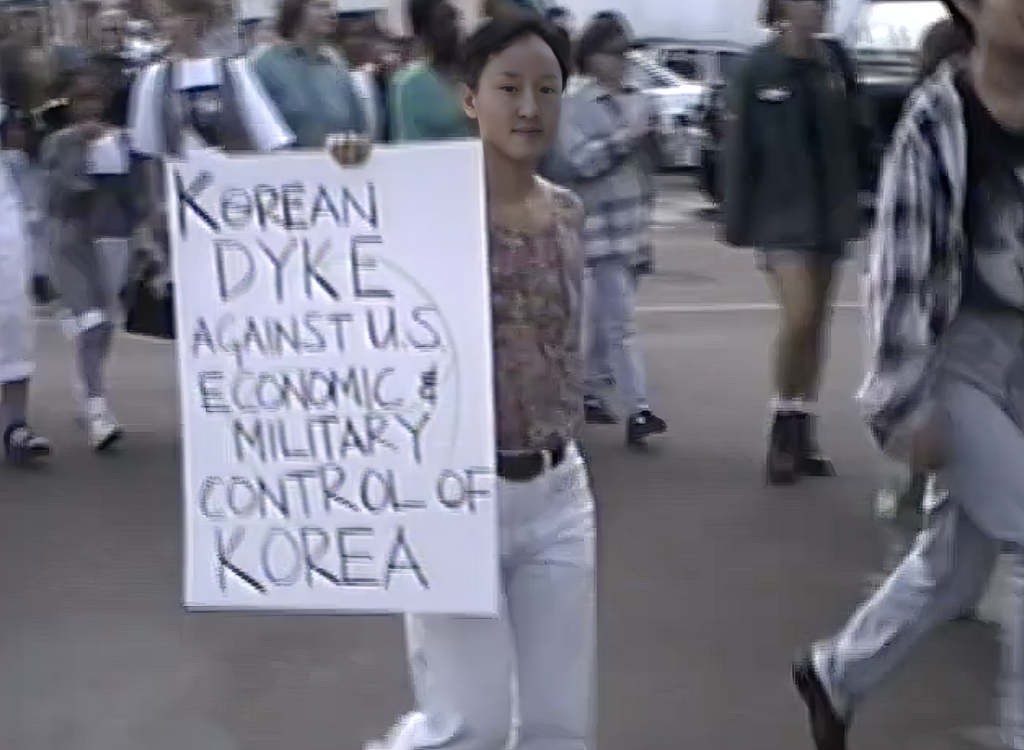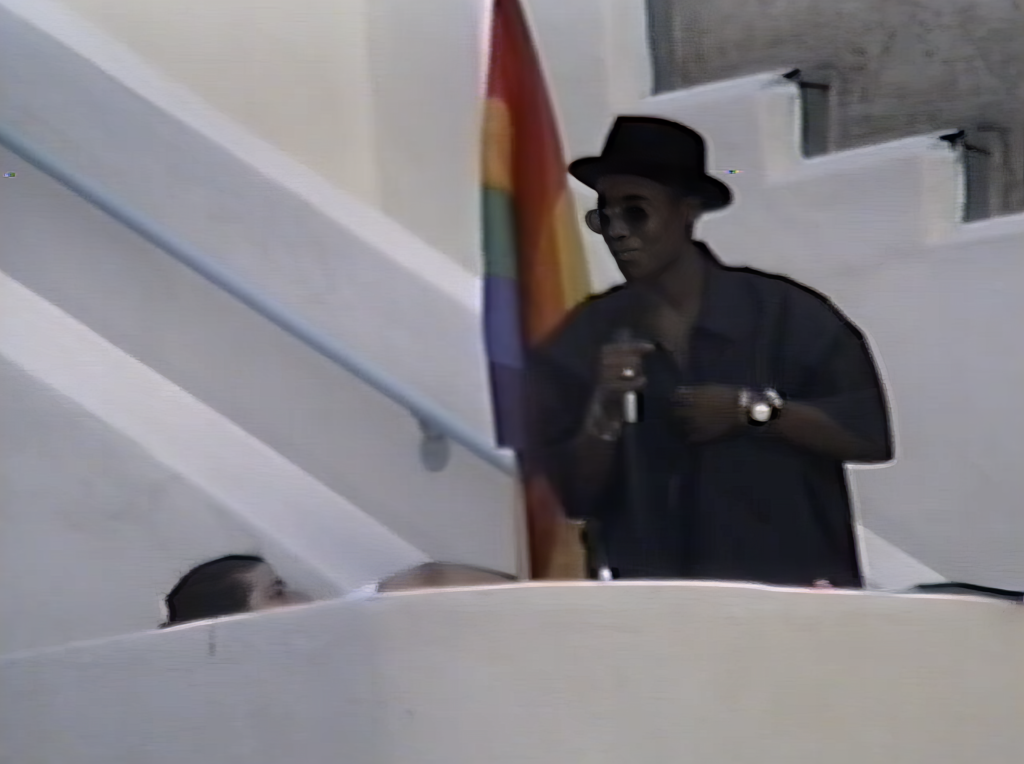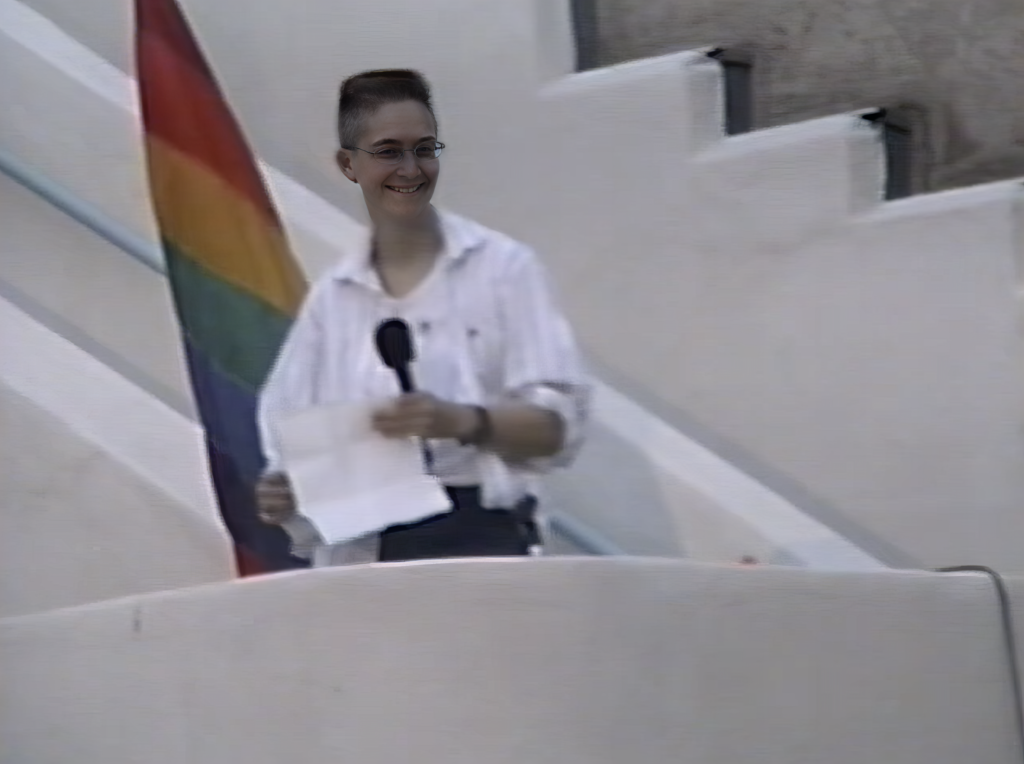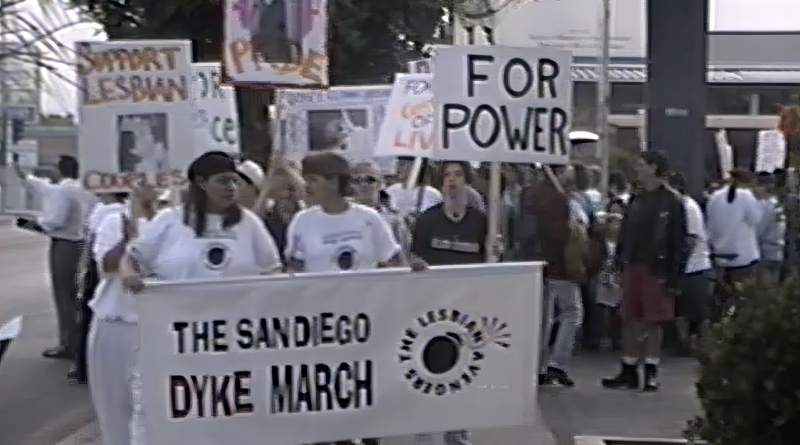Lessons from the Recent Past: What the First San Diego Dyke March Can Teach Us About Organized Action
By Dana Wiegand
Over the past few months, I have been digitizing some of the VHS tapes that have been donated to Lambda Archives and came across a tape that captured the entirety of the very first San Diego Dyke March, which took place on July 9, 1994. Watching the footage of the Dyke March and Rally filled me with inspiration and pride, and reinforced the need for events that invoke in-your-face activism against the systems of oppression that are working harder than ever to eradicate our rights. Fascists are attacking abortion rights and life-saving healthcare and imprisoning those who seek it out; they are passing legislation that directly targets and harms our Trans youth and their families; they are attacking our core rights to protest and exercise our freedom of speech; they are making efforts to remove LGBTQ+ and BIPOC content from our media because they know that representation and visibility equal power. When facing these realities on a daily basis, watching proud Dykes march in the street and shout, “You say don’t f*ck, we say f*ck you!” and “We’re here! We’re Dykes! We’re fabulous don’t f*ck with us!” evokes the urge to fight; to channel our frustration and justified anger into direct action and to show up for all members of our community.

The first Dyke March began at 3rd Ave. and University and ended with a rally at The Center, then located at 3916 Normal St. Speaking at the rally were emcee Molly McKay, who introduced each speaker and took a moment to both thank the Lesbians who were under 21 and reminded those there that she had Lesbian friends in the military who could not attend the day’s events because they could lose their career under Don’t Ask, Don’t Tell. Poet Tyna Hector who opened the rally by reading Pat Parker’s poem “Where will you be?” (1978), which served as a startling reminder of how long Christian fundamentalists in our government have been actively oppressing, attacking, and criminalizing queer people, and how many of those same people working against us in the 1970’s are still lurking in our current political climate.
Keynote speaker Jenora Lewis spoke on the importance of collective action, dialogue, building a legacy, educating youth, diversity within the Lesbian movement, and visibility. Jenora opened by introducing herself as a “shit-talking [Lesbian] of African descent, woman desire running through [her] veins; a lit. writing graduate of UCSD, budding feminist scholar; a public speaking dyke who is in the constant, relentless pursuit of excellence…” and gave thanks to the San Diego Lesbian Avengers “whose brand of rage fosters the type of diversity that has not been addressed in San Francisco and New York.” At the top of her speech Jenora posed these questions: “How do we speak to these first moments so that they crystalize into a rich historical legacy? How is it that we build with our bricks and mortar a Dykedom?” According to Jenora, building a movement requires you to show up; to educate; to not react to the opposition out of fear, but to think critically and maintain an inner balance; to honor “our mothers and our crones; to be brave and treat one another with respect.

“Thinking critically is what is going to keep our movement in forward momentum. Don’t just take everything you hear for face value…what we have right here right now is not possible until you have yourself in check…Each one of us has a personal responsibility to the movement to be in balance of self because there are a lot of situations that you will find yourself in where you cannot be intimidated…But the struggle is really about how it is when we come together and treat each other when it is in the moment of crisis…Do you understand that we must handle diversity among queer women in a better way? Let’s start today, let’s be committed to it, alright? if you’re raised to be warriors you cannot be the perpetrators of the same oppression and self-policing that you say you tried to eradicate.”
Dorianne Erickson Moore attested to the realities and discrimination facing the Disabled Lesbian community in San Diego, a severely under-served population within our community. She opened by reminding the marchers that not all Lesbians in the community are healthy enough to attend civil rights demonstrations such as marches and rallies because they are “too ill, they are isolated at home, they’re in the hospital, or they’re dead. Welcome to San Diego’s Disabled Lesbian Community…” Dorianne spoke candidly about the discrimination she and other Lesbians with Disabilities faced within the San Diego Lesbian community, stating that.
“Physically ill or disabled Lesbians are everywhere; we are your friends, your family, your lovers. But many of us are closeted about our disability. Why? Because there are few reasons to come out. Even in our own community it is an alienating and difficult experience. By just trying to have my basic needs met I have been treated like a lying, whining, and demanding person. I’ve been challenged by Lesbians who tell me that many people do lie about being disabled so they can get away with things. Why someone would lie about something so embarrassing is beyond me. Asking for special consideration is very difficult; we need to change this.”

She additionally called for increased funding for non-HIV related health services for Lesbians and “all physically ill and disabled queers.” While some groups such as HEAL (Health, Empowerment, and Advocacy for Lesbians) and The Center’s Lesbian Health Project existed, the vast majority of the community’s funding for health-related services was understandably directed towards HIV and AIDS related programs. Though that is not to say that the under-service of women’s health needs was or is a problem exclusive to our community in the 1990’s; rather, it is a systemic issue within the healthcare industry that persists to this day. Sadly, we are currently living in a country in which some states have passed legislation which not only removes a woman’s right to have bodily autonomy and make the choice to have an abortion but goes as far as criminalizing miscarriages and preventing treatment for ectopic pregnancies. These uninformed decisions and the inability to access these services will primarily impact women within marginalized communities. A person’s intersectional identities, such as race, ethnicity, sexual orientation, gender identity, age, socio-economic status, and employment status will further affect the treatment they receive from medical professionals. Discriminatory legislation is also being passed to criminalize our Trans youth and punish their families and other people who support their transition. In response to these injustices, we have seen mass protests in which people of all identities show up to march in solidarity with those affected. At the beginning of the video Wendy Sue Biegeleisen is seen providing instructions to the marchers regarding the route, preventing police harassment, and requesting that men supporting the march cheer for them along the parade route so that the focus could be completely on the women–and they enthusiastically did so, holding up signs which read “Hooray for our Lesbian Leaders!” and “Fags LOVE Dykes!” But now is the time for all people to show up and march in solidarity with women in our community and our Trans and nonbinary family; we cannot put the entirety of this labor on the populations being targeted. As Dorianne said, “We are lucky to have [Lesbian health groups] but they cannot even begin to do enough without your help and the help of our Gay brothers.” True solidarity means showing up for EVERYONE in our community.
After Dorianne’s speech the reigning Miss Gay San Diego, Beth McHale, spoke about reclamation of words, such as Dyke, which have historically been used by oppressors; Ellen Hines, a local Lesbian musician, performed Lesbian-themed songs; and the rally closed with the Lesbian Avengers’ traditional fire-eating ritual. Attendees of the rally enthusiastically listened to these incredible women share their experiences and encourage them to actively participate in increasing access to essential services for an underserved group in our community. I highly encourage everyone to watch the full footage of the first San Diego Dyke March on the Lambda Archives Preservica page here: https://tinyurl.com/yc2eppyy as roughly 1,000 words is not enough to do it justice.

